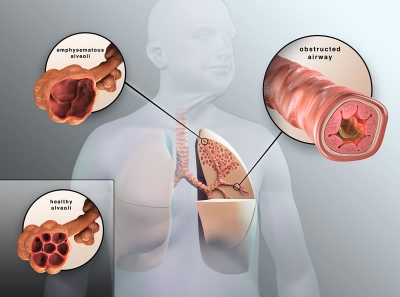What can emphysema contribute to?

Emphysema is a type of COPD (chronic obstructive pulmonary disease). COPD is a group of lung diseases that make it hard to breathe and get worse over time. The other main type of COPD is chronic bronchitis. Most people with COPD have both emphysema and chronic bronchitis, but how severe each type is can be different from person to person.
Emphysema affects the air sacs in your lungs. Normally, these sacs are elastic or stretchy. When you breathe in, each air sac fills up with air, like a small balloon. When you breathe out, the air sacs deflate, and the air goes out.
In emphysema, the walls between many of the air sacs in the lungs are damaged. This causes the air sacs to lose their shape and become floppy. The damage also can destroy the walls of the air sacs, leading to fewer and larger air sacs instead of many tiny ones. This makes it harder for your lungs to move oxygen in and carbon dioxide out of your body.
The cause of emphysema is usually long-term exposure to irritants that damage your lungs and the airways. In the United States, cigarette smoke is the main cause. Pipe, cigar, and other types of tobacco smoke can also cause emphysema, especially if you inhale them.
Exposure to other inhaled irritants can contribute to emphysema. These include secondhand smoke, air pollution, and chemical fumes or dusts from the environment or workplace.
Rarely, a genetic condition called alpha-1 antitrypsin deficiency can play a role in causing emphysema.
Picture Credit : Google
